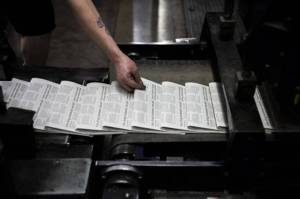Comment: How to raise corporate taxes without hurting workers
Published 1:30 am Friday, April 2, 2021
By Noah Smith / Bloomberg Opinion
With so many big-ticket spending items on the table from President Biden’s administration, legislators are understandably looking for ways to pay for it all. One proposal is to raise the corporate tax. Some fear that this would make the U.S. an uncompetitive place to do business, but there’s a way to adjust the tax so that it gives the advantage to U.S. workers.
Though we don’t actually need tax increases to pay for a lot of the infrastructure ideas (because the investment will earn a positive return over time), the U.S. needs higher taxes in general to fund ongoing social programs such as the child allowance, as well as to curb fears about long-term structural deficits. That’s why Biden is now expanding the amount of tax hikes included in his infrastructure proposal.
Among the proposals is an increase in the corporate tax. As my Bloomberg Opinion colleague Justin Fox reports, corporate tax revenue has been falling for decades; former President Trump’s 2017 tax cuts were only the latest step in shrinking corporate tax revenues into insignificance.
Higher corporate taxes do have drawbacks. Although it mostly doesn’t come out of the pockets of the middle class, it does tend to reduce business investment. That’s a drawback at a time when businesses have generally been investing less, and when they need to invest more to take advantage of emerging technologies. So any corporate tax increase should be paired with exemptions for investment; for example, accelerated depreciation allowances.
Another oft-cited concern is that higher corporate tax could make the U.S. less attractive as an investment destination. The U.S. used to have a so-called “worldwide” tax system, where companies headquartered here would pay the same taxes no matter where they earned their money. Trump’s reform shifted us to a “territorial” system, where companies are taxed based only on what they earn in the U.S. But that means that if U.S. corporate taxes go up, it will provide a strong incentive for businesses to move factories and offices offshore to evade the high U.S. rate. That’s definitely not the result Biden is hoping for.
Fortunately, there’s a ready fix for that problem, too. It’s something that Congress considered during the lead-up to Trump’s tax reform, but — unfortunately — ultimately decided not to try. It goes by the unwieldy name of Destination-Based Cash Flow Tax, or DBCFT.
Conceived by Berkeley economist Alan Auerbach, this tax would target cash flows, not profits. This would be preferable for several reasons. First, it would let companies expense investments when they made them, not when they depreciate, a big investment incentive! Second, it would automatically eliminate the tax deductibility of interest, which would stop favoring debt finance and put the financial system on a sounder footing.
Third, it would tax companies based on where sales are made, rather than where production takes place. That means that if a company makes a car in China and sells it in the U.S., it’ll pay some taxes to the U.S. instead of just to China. This is sometimes called a “border adjustment,” but it actually doesn’t require any adjustment at all; it’s just a natural feature of how a cash-flow tax works.
Obviously, this removes a reason for companies to move production overseas and would boost Biden’s efforts to reshore U.S. supply chains. It’s not a big deal now because corporate taxes are so ultra-low following Trump’s tax cuts, but if Biden wants to reclaim some of that revenue, the cash-flow tax would be a very useful tool for preventing the erosion of U.S. industry.
There are some legal objections to this type of tax; some believe it would violate certain arcane rules of the World Trade Organization. But in a 2017 paper, Auerbach showed that a destination-based cash-flow tax is mathematically equal to a value-added tax (VAT) with a deduction for wages.
A VAT is like a sales tax, and cash flow is basically sales minus wages, so taxing cash flow is like taxing companies’ sales while letting them deduct the amount they pay their workers.
VATs are used heavily throughout Europe and have the advantage of being easy to collect and difficult to avoid. VATs are sometimes criticized for being regressive because they affect all people equally regardless of their ability to pay. Deducting wages from the tax would make it progressive, because if wages are tax-exempt, companies have an incentive to pay their workers more. And if the revenue from the tax were used to fund policies like the child allowance, the whole package would be even more progressive.
In other words, such a package — replacing the corporate tax with a VAT plus a wage subsidy — might actually be an easy sell to voters. It would give Americans a raise, while taxing businesses to support social programs. It would be a major reform, but it’s something Congress should consider.
Noah Smith is a Bloomberg Opinion columnist. He was an assistant professor of finance at Stony Brook University, and he blogs at Noahpinion.


